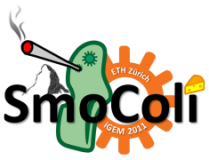Team:ETH Zurich/Biology
From 2011.igem.org
| Line 28: | Line 28: | ||
{|class="roundContainer" | {|class="roundContainer" | ||
| | | | ||
| - | |||
| - | |||
== BioBricks and experimental results == | == BioBricks and experimental results == | ||
| Line 39: | Line 37: | ||
{|class="roundContainer" | {|class="roundContainer" | ||
| | | | ||
| + | [[File:SmoColi.JPG|350px|right|thumb|'''SmoColi pixels''' | ||
| + | :)As a side project we sort and spotted ''E. coli'' expressing either RFP, GFP or β-galactosidase with a FACS machine.]] | ||
| + | |||
== Network elements == | == Network elements == | ||
Revision as of 03:26, 22 September 2011
| Biology |
| ||
| A brief overview of our SmoColi system can be found here. | |||
General ideaSmoColi is a bacterial system which is able to sense and quantify smoke in the air. The quantification of smoke works in the same way as a thermometer: A band of GFP gets shifted along an axis depending on the concentration of smoke sensed by the bacteria. If the amount of smoke gets too high, an alarm system is switched on (system turns red) and thus warns people when the smoke could cause health damage. Experiments are performed in Escherichia coli strains JM101 and DH5α. We established SmoColi as a compatible three plasmid system with different antibiotic resistances. Thus we are able to include the whole network into the same cells. See Technical implementation for details about the biological implementation. SmoColi can be used in channels and tubes of different sizes depending on the application field. Because of the simple setup of the system it is a convenient mean to define concentrations of sensor molecules from air probes. It could be used for example as a rapid test to quantify specific molecules in probes.
|
BioBricks and experimental resultsOur BioBricks added to the registry can be found in the BioBrick chapter.
|
Network elementsThe SmoColi circuit design can be divided into three different subsystems: 1. a sensor 2. bandpass filter 3. alarm system Both a repressor (coupled to an inverter) or an activator can be used as sensor parts of the system. In our case we used AlcR (from aspergillus nidulans), respectively XylR (from pseudomonas putida) regulatory proteins in order to sense compounds present in smoke and thereby to induce the different parts of our network. Upon sensing the specific molecule the circuit gets activated and our SmoColi bacteria start notifying us about the presence of toxic substances in air. For a detailed description of the circuit design please click here.
|
 "
"



